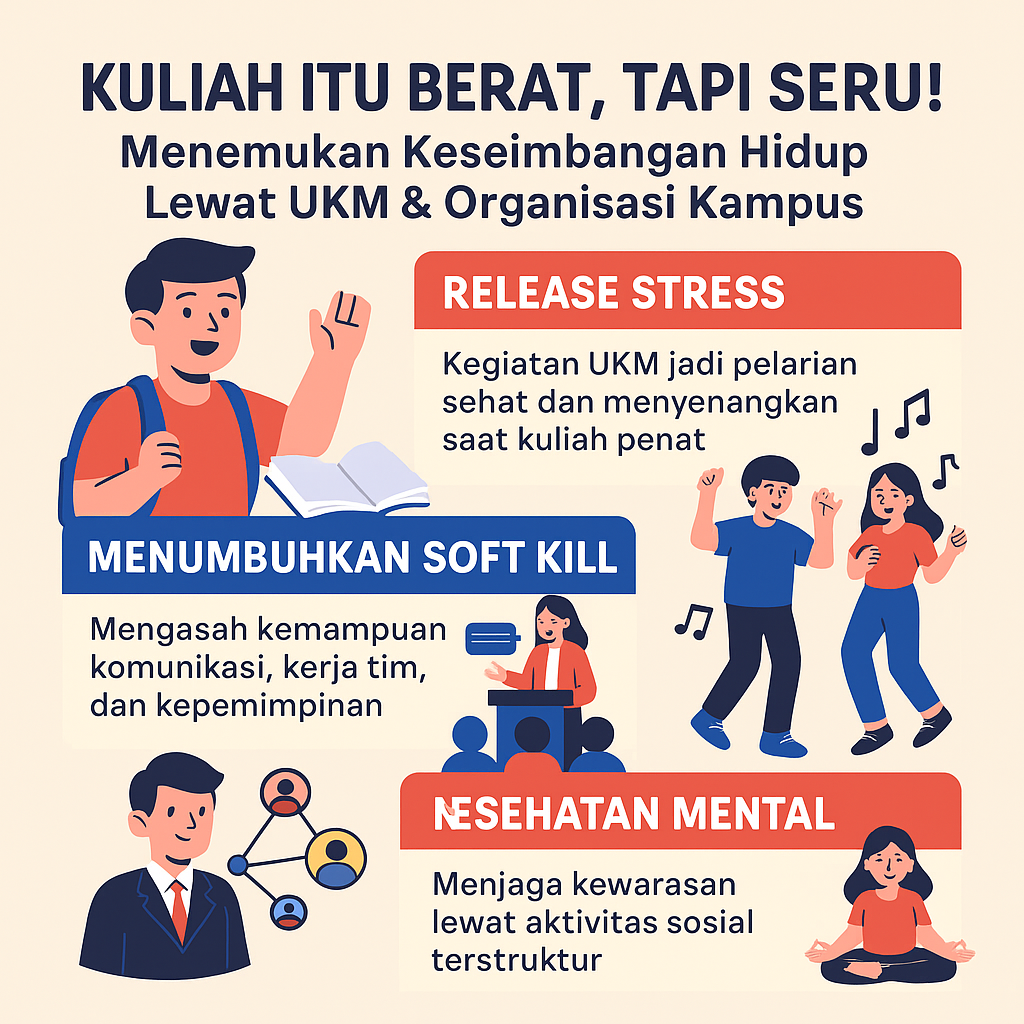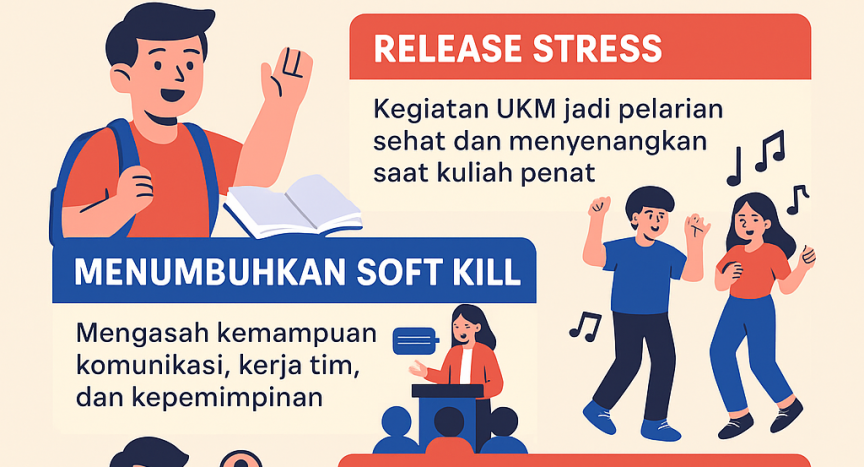📚 The Reality of College: Heavy, Dense, and Full of Challenges
For many new Telkom University students, college often feels like a “life leap” from the relaxed high school years to a much more serious world. Assignments come in torrents, deadlines seem endless, and academic pressure can sometimes be overwhelming.
Even for final-semester students, the pressure can be even greater—from theses to internships to future plans.
According to a 2024 internal survey by the Directorate of Student Affairs at Telkom University, approximately 64% of students admitted to experiencing high levels of academic stress during their studies. This data demonstrates that the burden of studying isn’t just a myth, but a reality that needs to be addressed wisely.
“Students often feel the need to be perfect academically, but a healthy work-life balance is also crucial. Maintaining balance can actually maximize your achievements,”— BK Telkom University
😌 Why Do Students Need a Stress-Relieving Space?
Academic stress is normal, but if left unchecked, it can negatively impact mental health, enthusiasm for learning, and even the quality of campus life .
Some signs that students are experiencing excessive stress include:
- Difficulty focusing and difficulty sleeping
- Easily tired mentally and physically
- Extreme procrastination
- Becoming more irritable or withdrawing from social interactions
Finding ways to recharge is crucial for students to maintain mental and social well-being.
One of the most effective ways to do this is through Student Activity Units (UKM) and campus organizations .
🏫 Get to Know UKM & Organizations at Telkom University
Telkom University has a diverse student activity ecosystem, ranging from sports, arts, and technology student organizations to student organizations at both the faculty and university levels.
Some popular examples include:
- Arts & Culture UKM (dance, choir, theater)
- Sports UKM (basketball, futsal, archery, martial arts)
- Technology & Research Community (robotics, coding, astronomy)
- Student Organizations (BEM, HMJ, environmental communities, spirituality)
UKM basketball activities are often a forum for cross-study program friendships.
Activities in student clubs and organizations are more than just casual get-togethers. Many students find a place to grow , pursue their hobbies, and meet friends with similar interests.
⚡ 1. SMEs and Organizations = Space for Stress Release
When college days are filled with lab reports, pop quizzes, and group assignments, student activity units (UKM) often provide a pleasant, healthy escape.
Imagine, after a tiring class, practicing basketball with friends, jamming to music, or simply having a lighthearted discussion in the campus startup community.
“For me, joining the music club is a way to escape from the pile of assignments. When I play music with my friends, I feel so relieved. The next day, I feel more enthusiastic about studying,”— Rafi (21), an undergraduate student in Informatics and a member of the choir club.
This activity helps the body release endorphins — the happy hormones — which naturally lower stress levels and improve mood.
🌿 2. Developing Soft Skills Not Learned in Class
While lectures may teach theory and technical skills, communication, teamwork, leadership, and time management skills are often honed more effectively through organizational activities.
Students who are active in organizations usually have higher self-confidence , are more accustomed to public speaking, and are more sensitive in working with people from different backgrounds.
For example, being on a campus event committee teaches you how to coordinate with multiple parties, solve sudden problems, and remain calm under pressure. These skills are invaluable in the workplace.
🤝 3. Building Social & Professional Networks
One of the biggest benefits of joining student activities (UKM) and organizations is networking . You’ll meet seniors, supervisors, and students from across departments or faculties who may one day become colleagues, research collaborators, or even business partners.
“The relationships I built through campus organizations turned out to be very useful after graduation. Previously, we were both on the event committee, now we are working partners at a startup,”— Nadya (24), Telkom University alumnus, ex-BEM FT
This network can also open up opportunities for internships, competitions, and even scholarships abroad. It all starts with an active campus environment.
🧠 4. Students’ Mental Health Becomes Better Maintained
Many studies show that structured social activities such as campus organizations can help reduce students’ risk of depression and burnout.
A 2023 study by the American College Health Association found that students who were active in campus organizations were 30% less likely to experience severe stress than those who focused solely on their studies.
Social activities provide a sense of belonging, emotional support, and a healthy mental break from the academic routine.
⏰ 5. Key: Time Management
Of course, being active in an organization doesn’t mean you can neglect your studies. The challenge is finding a balance between the two .
Here are some simple tips:
- Create a weekly schedule and prioritize college assignments
- Communicate the schedule with UKM friends and lecturers
- Learn to say “no” to non-priority agendas.
- Take care of your physical health — get enough sleep and eat regularly.
“I used to be overwhelmed because I had too many activities. After learning to manage my time, it turns out that both can go hand in hand,”— Dian (20), DKV undergraduate student & member of the Campus Theater
📝 The Role of the Campus: Support for Active Students
Telkom University actively supports student activities through:
- Campus facilities such as UKM buildings, sports fields, and creative spaces
- Student Leadership Development Program to train soft skills
- Scholarships and awards for outstanding students in non-academic fields
- Psychological counseling through BK Services to maintain mental health
Campus facilities that actively support student activities

🚀 Real Inspiration: Active Students, Remaining Brilliant Achievements
Telkom University has many examples of students who are active in organizations but still excel academically. For example:
- Raka , a Telecommunication Engineering student who is also the Head of the Archery UKM, managed to achieve a GPA of 3.85 while being a campus athlete.
- Putri , a member of BEM and the AI research community, won a national startup competition without sacrificing her on-time graduation.
- The UKM Choir Team successfully performed at an international festival, while maintaining their academic achievements.
These stories show that being active in organizations doesn’t hinder your studies — it actually enriches your campus life experience .
Balance is the Key
Studying at Telkom University is indeed demanding—assignments, exams, and the pressure of the future can sometimes be stressful.
But by being active in student organizations and student activities, students can find a balance between academics and social life , maintain their mental health, and build future skills.
So, don’t just be a “classroom and boarding student.”
Try to open yourself up, find activities that suit your interests, and enjoy your college years more fully. 🌿🎶🏀
“College isn’t just about grades. It’s about growing as a whole person.”— BK Telkom University
📚 References
- Telkom University Directorate of Student Affairs (2024). Student Mental Health Survey Report .
- American College Health Association (2023). National College Health Assessment Report.
- Internal interview with Telkom University students (2025).
Keyword
- Telkom University student life
- UKM and campus organizations
- student stress management
- college life balance
- student mental health
